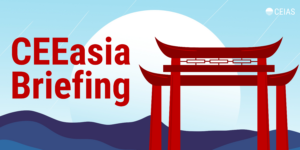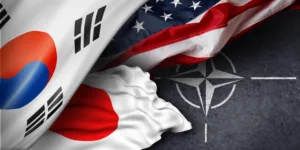Welcome to the 3rd issue of the #CEEasia Briefing.
In this issue, we dissect the following topics:
- Questionable ethics of Uyghur workforce
- COVID-19: Regional update
- South Korea as a role-model of fighting against the virus?
- Tokyo 2020: Postponement on the table?
Questionable ethics of Uyghur workforce
What is going on? Apple, Samsung, Adidas, Nike, Zara, Gap, and many other well-known global brands’ products might be made in Chinese factories using forced labor. Uyghurs and other Chinese ethnic minorities work in factories that are involved in the supply chains of more than 83 major global brands of various sectors, including the automotive and fashion industries. There are at least 27 factories in China that are using Uyghur workers, who have been detained in Xinjiang, put into “re-education camps” and then sent to factories in other Chinese provinces.
What does it mean? Companies using forced Uyghur labor in their supply chains are directly or indirectly complicit in the exploitation of the workers. This poses serious legal issues for those firms as they violate their own countries’ laws which usually prohibit imports of products manufactured with forced labor or slavery. There are many European giant companies mentioned in the report published by the Australian Strategic Policy Institute, including BMW, Electrolux, H&M or Jack & Jones, which might have had their products made by Uyghur workers. This issue highlights the need to employ a strict supply-chain due diligence and compliance regime on part of the companies importing from China.
In Central Europe. Most of the developed countries, including the CEE region, import a large portion of their consumables as well as parts and components crucial for their industries from China, profiting from its relatively cheap labor and simultaneously overlooking the issues that come with it. However, some of the countries are not willing to address the human rights violations that happen in China as they fear losing business opportunities.
Further reading:
Australian Strategic Policy Institute: Uyghurs for sale
ABC News: Apple, Nike and other major companies implicated in Muslim forced labor in China
COVID-19: Regional update
What’s going on? Since the outbreak of Covid-19 in China, the situation has escalated quite quickly. While China for the first time reported no new cases of local transmission, the European continent has become a new hotbed of the spreading virus. As Europe has struggled to come up with a unified answer countries have reacted in highly individual manners according to their considerations. Bigger economies such as the United Kingdom, France and Germany had been for a long time reluctant to implement any disruptive measures. However, in Central Europe, where the economy seems to be less of an issue, some countries have chosen rather enhanced measures right from the beginning.
In Central Europe. Since our February report, the situation surrounding the Covid-19 in Central Europe has escalated. In the past two weeks, regional countries have begun reporting a rising number of cases which are now on a steady increase. Many countries introduced sweeping restrictions such as Slovakia, that decided to close down airports and implement countrywide social distancing measures after diagnosing its first cases. Czech Republic, on the other hand, only began to act once the number of infections reached a certain number. Another new development is deteriorating cybersecurity as the majority of work is being done online from home. The University Hospital in Brno (Czechia) was hit by a cyberattack which further underlined the opportunity for cyber-crime created by the COVID-19 chaos.
The pandemic will also test the region’s democracy. The first to fall is Hungary where the government proposed a bill suspending the Parliament, elections, and referenda till the end of 2020. Orban’s government would be allowed to rule the country by decree. While the bill was not supported in the first round of voting, it is expected that Orban will gain the necessary 2/3 majority in the upcoming second vote.
On another note. One of the hugely discussed aspects of the Covid-19 has been also the Chinese aid sent to some of the CEE countries. After the Czech Republic had sent almost four tons of medical aid to China in February, the Ministry of Interior has ordered more than 1 million respirators and 5 million protective masks to arrive back from China. The Czechia-China air bridge was also offered to Slovakia as a way of delivery in case Slovakia decides to buy further supplies from China. The similar cooperation and medical aid was given to countries such as Italy and Serbia. However, what the media fail to emphasize is that a certain part of these ‘donations’ is paid by receiving countries. Many people thus begin to criticize China for profiting out of the pandemics it helped to create in the first place.
Further reading:
Relief Web: Czech Republic sent material aid to China to fight the coronavirus
iRozhlas: Firmu, která měla dodat z Číny pět milionů roušek, někdo podvedl…
Twitter: Thread by Giulia Pompili
Hospodárske noviny: Koronavírus: Matovič skontroloval zásoby v skladoch…
Prague morning.cz: Czech-Republic’s Second Biggest Hospital is Hit by a Cyber-Attack
South Korea as a role-model of fighting against the virus?
What is going on? Besides a widespread narrative about a successful Chinese story, South Korea circulates in the media as an example of a country that underwent serious measures to tackle the virus and seems to be doing well. Experts and politicians in the V4 countries point out to South Korea as a country with some of the best practices. From early preparations in terms of developing the detection kits to strict quarantine and extensive testing. The government mobilized relevant units on all levels, from governmental to municipal, similarly to the SARS situation in 2003. Experts believe that a low mortality rate is achieved through massive testing. It is estimated that Korea has a daily capacity to test 20 000 people. Even drive-thru testing centers were opened, with citizens receiving SMS-notification on their result afterward. The testing was free and available also for asymptomatic individuals.
The government also raised awareness via mobile app Corona 100m, which informed the public on closely located known cases, based on mobile phone records, credit card receipts and other private data of infected citizens. From mid-March, every Korean can apply for a subsidy- approx. 340€, to cover basic living costs. Korean government did not restrict traveling from and to South Korea, as they rely on testing and strict consecutive quarantine regime. However, from 22 March, all incoming travelers from Europe have to undergo testing at the airport, which might take up to 24 hours. In case of positive results, they will be transported into the hospital for the treatment. It is expected that these measures will be extended to the US and Asian countries soon.
Despite the state-of-the-art measures, the virus will most probably continue to spread. However, with the capacity of its health system above OECD standards and systematic approach, a positive outcome can be predicted. On the other hand, the Korean government has to deal with economic impacts as well. Nearly 14 billion USD were provided as a stimulus at the early stage of the crisis. President Moon created an emergency economic council to implement further tools to save and restart the Korean economy. Besides supply chain shocks, Koreans will face a flop in the tourism and travel industries, especially companies such as Korean Air.
Why does it matter? South Korea is one of the most important investors in the CEE region. Factories of South Korean companies will be also affected not only by severe restrictions and the absence of the workforce. They will be affected also by supply chain drop-outs and general financial problems of their Korean headquarters. However, the Korean approach in fighting the coronavirus and its impacts on the population as well as the economy, provides an inspiring example and school of best practices for Central European countries. It also serves as an alternative narrative to China of an Asian country stricken by the virus and being successful in dealing with it.
Further reading:
The Diplomat: South Korea Braces for Global Recession
MZVaEZ SR: Kórejská republika – Aktuálna situácia výskytu nového koronavírusu
Al Jazeera: Testing times: Why South Korea’s COVID-19 strategy is working
Tokyo 2020: Postponement on the table?
What is going on? The coronavirus pandemic has already “wiped out” most major sports events this year and the number of confirmed infections of Covid-19 is rising globally, Japan alone detecting more than 1000 cases. Despite that, Tokyo originally confirmed the Olympics would go ahead as planned, now even considering relaxing some of the restrictions imposed because of the virus. China and South Korea supported Japan’s decision and Japanese PM Abe Shinzo stated that Japan was confident in overcoming the infection and hosting the Olympics without any problem. However, in light of a protracted pandemic, Abe hinted that postponement might be the only option during the 23/3 Diet session. Nonetheless, the International Olympic Committee will make the final decision about whether Tokyo 2020 starts in July.
Why does it matter? In case the summer Olympics get postponed or even canceled, the Japanese economy will take a hit. They were intended as part of the Japan tourism development plan. Prime Minister Abe Shinzo came up with an ambitious plan to reach 40 million tourists a year in 2020. Tourism and its unprecedented growth were to be one of the pillars of the Japanese economy. As a result of the recent tensions between South Korea and Japan, as well as the situation in Hong Kong, the growth in the number of tourists has already slowed significantly. Tokyo 2020 going ahead as scheduled could help Japan to recover its economy which has been affected by the novel coronavirus outbreak. That is why the government is weighing the risks of cancellation very seriously as the event is one of the only chances of “reducing the damages” on the economy, which is already in need of a boost.
Meaning… Cancellation of the Games would have an impact not only on Japan which would lose multi-billion-euro investments, its tourism would suffer significantly, and domestic consumption could freeze as well, but the effect would be global. Japan is the world’s third-largest economy. If it falls into recession it will undoubtedly have an impact on its major trading partners, one of the biggest being Germany which Central European economies are interlinked with, and whose economy is also wobbling.
Further reading:
CNBC: The Olympics are the ‘only silver lining’ for Japan’s economy right now, analyst says
The Diplomat: What Would It Cost to Cancel the Tokyo Olympics?
The New York Times: Will the Olympics Go On? Japan’s Businesses Would Like to Know







